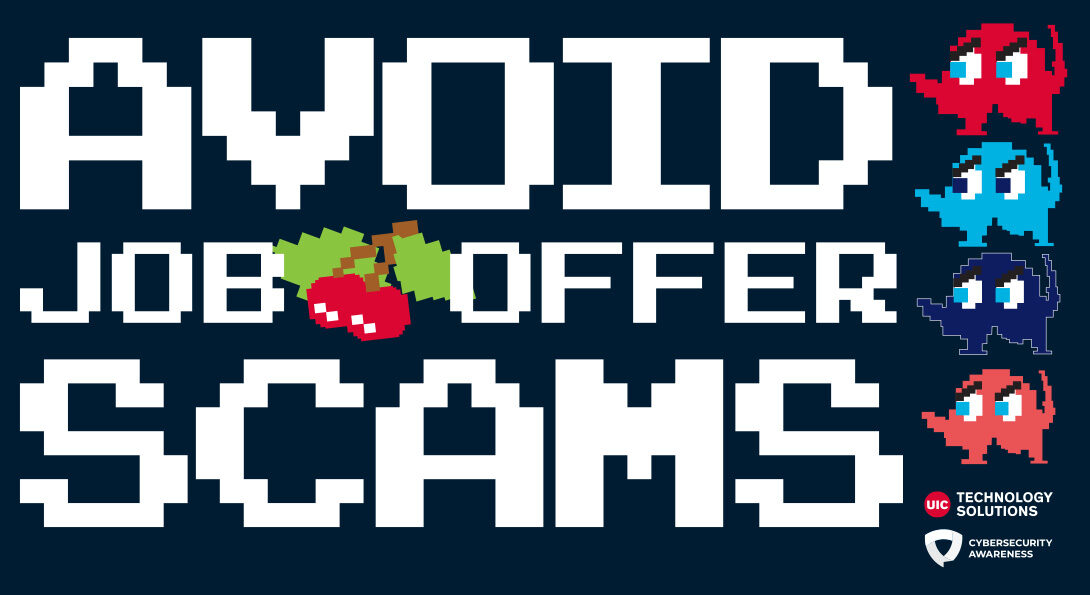Sounds Too Good to Be True? Beware of Job Offer Scams! – Official UIC Cyber Security Awareness Campaign 2022

intro
Cyber criminals frequently target students with job offers through email or text messages that sound too good to be true, to access personal information and use it to hack accounts and steal money!
How Cyber Criminals Use Job Scams

Scammers target students with fake internship and job offer emails inviting them to apply, but their ultimate goal is to steal information and/or money. Oftentimes, these scammers rely on making a person act quickly, not giving the victim time to consider their actions.
The UIC Information Security team works diligently to prevent and mitigate email based cyber attacks, but some can occasionally slip through our defenses so it’s important that you remain diligent. Learn how to spot a job scam email by keeping an eye out for common signs and immediate red flags.
intro
Cybercriminals use spoofing technology or hacked passwords to send emails from a “@uic.edu” email address. Know how to spot a scam.
How to Spot a Job Scam Targeting the UIC Community
Did you know? Scam emails can come from a @uic.edu email address. Scammers use email spoofing methods to forge a UIC email address and make it appear as if the email is being sent by a UIC employee. Recipients may fall victim to these scams, believing it is coming from a legitimate UIC contact. In some cases the scammer might even be using a real UIC account of someone that has fallen victim to a phishing attack and had their credentials compromised.
Identifying a scammer using a @uic.edu email address may be difficult, however, there are a few signs you can look out for:
- Big payment for little work. An immediate red flag is when a scammer offers a large payment for very little work. Examples include: “$500 a week for working 1 hour per day, 2-3 times a week.” As the old saying goes, “If it’s too good to be true, it probably is.”
- Scammers may send you a check to deposit. One of the main reasons students can fall for this scam is because scammers will send a check you can deposit for your payment, plus an additional amount that the scammer will need you to send to another account as part of the scam. The checks can be deposited but will be flagged later by the bank as fraudulent. By then, you will have sent funds, usually in the form of gift cards, to the scammer and in addition to losing money you may also be responsible for subsequent bank fees.
- Filled with typos and grammatical errors. Most of the time, though not always, scam emails or text messages will be written very poorly and contain typos and grammatical errors. In the email below, you can see the message is filled with grammatical errors.
- Asks you to reply and provide a non-UIC email or phone number. Scammers want you to send them your personal contact information so that they can contact you outside your UIC email. This is because scammers want to avoid being caught by our vigilant security team.
- Asks you to contact them at a different email address. Scammers will sometimes request that you contact them at a different email address rather than the original “From” email address.
Did you receive a suspicious email or text message? Here’s what to do:

Evaluate incoming emails for red flags including poor grammar and typos, offers that are too good to be true, or being asked to reply from an alternate email address. If you receive a suspicious email, do not reply, click on any links, or download any attachments.
Do not hesitate to forward a potential scam email to security@uic.edu immediately to help our security team keep the UIC community safe from cyber criminals!
2022 UIC NCSAM Quiz
Show us what you’ve learned this week for a chance to win one of eight $50 gift cards to the UIC Bookstore! Simply take this week’s quiz by Sunday, October 16th, 2022 at 11:59PM and earn a score of 100% to qualify. See rules here.